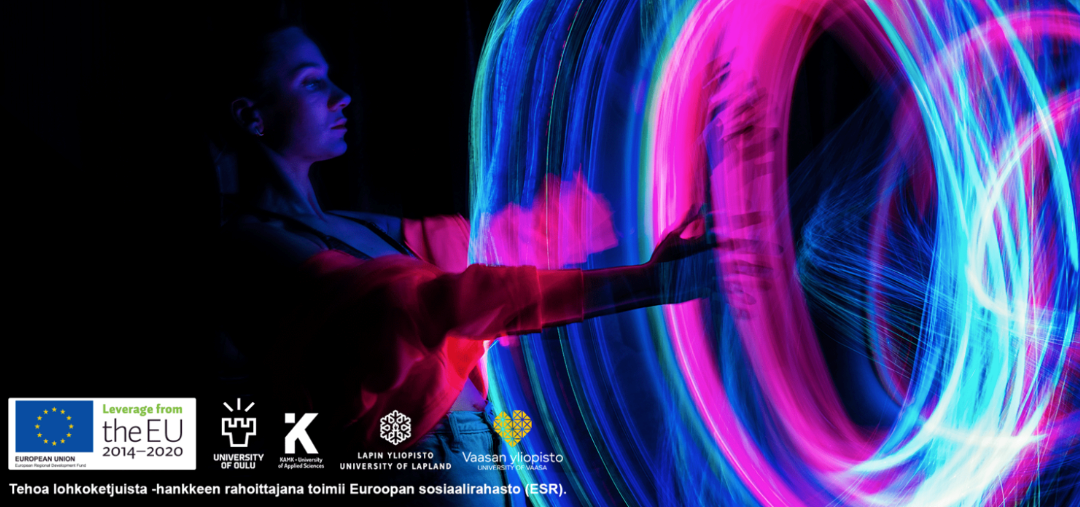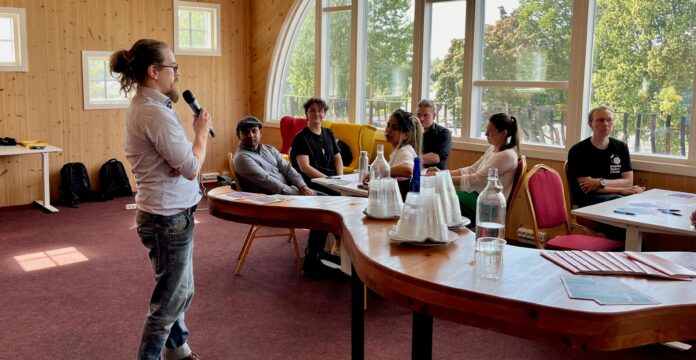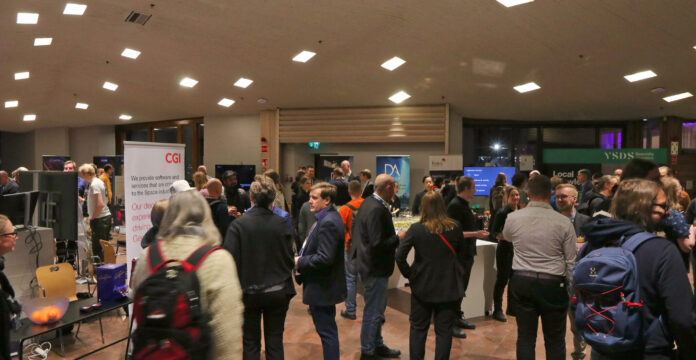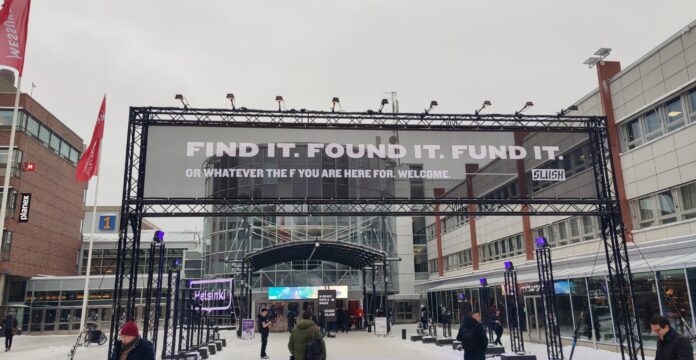Blockchains are a disruptive technology in many ways. They are changing the status quo of current business by reducing intermediaries, as well as creating new business opportunities. Blockchains are not another fancy database, but completely new method of creating trust, collaboration and synergies in the digital world. These improvements may not be immediately apparent to end-users on the surface. However, beneath the surface, the benefits are game-changers.
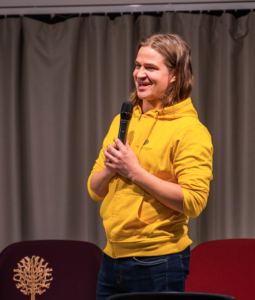
During the past years, the project consortium has developed six new training modules concentrating in blockchain. In addition, a couple of weeks ago the project arranged a seminar and a hackathon in Oulu in collaboration with the OP Lab.
The seminar that the Digital Economy research platform of University of Vaasa was in charge of, was a captivating event that brought together universities, blockchain experts, developers, and enthusiasts to discuss the latest trends, developments, and future of blockchain technology.
Experts from academia and technology leaders from companies such as Superhow?, Chainlink, Joisto, Interjektio, Q4US and OP Lab shared their knowledge on the blockchain business and technology.
Hype or real opportunity?
Blockchain technology has been gaining momentum over the years, and it is transforming various industries, including finance, healthcare, real estate, and supply chain management. Currently, blockchains might not be clearly visible to end-users. Nevertheless, blockchains are already bringing efficiency and trust to complicated processed in the back-end, which could not be accomplished with traditional technologies. Situation in these traditional industries also might be, that blockchains are not preferred to be mentioned as enablers, due to reputation resulted from cryptocurrencies. Despite overheated hype and bad reputation caused by Crypto-winter, the main question still appears to be about the timeline of the transformation, not if the transformation will actually happen or not. Unfortunately, many people still think that Blockchain equals Bitcoin, and this is slowing down the process.
Unfortunately, many people still think that Blockchain equals Bitcoin.
The topics of this seminar reminded me of attending the Slush 2016, where I listened to panel discussions of AI and music, especially how AI will be able to produce music in the future. As an amateur musician, I then thought this was a utopian conversation. Well, much has happened since, and today this is definitely doable with tools such as Soundful.com. We will see, how the upcoming years will treat blockchain technology.
In this blog, you are able to find summaries of topics, discussed in the seminar held in Oulu. Additionally, full seminar presentations are included as video clips, in order to give you full review of the topics. Longer report of the seminar can also be found from the project’s website.
Aušrinė Šilenskytė – Approaching blockchain adoption strategically
Aušrinė Šilenskytė from UniVaasa started the seminar with a presentation of Approaching blockchain adoption strategically. Her key message was that use cases needs to analyzed carefully from both technical and social points of views. For instance, the speaker cited the case of TradeLens, a blockchain-based supply chain platform that failed due to the underestimation of social structures and it’s complexity. Technology itself doesn’t provide benefits, if people will not adopt it.
Aušrinė discussed, that important consideration when adopting blockchain technology, is whether a company needs a firm-level or industry-level solution. It’s very important to understand that there are actually three main types of different blockchains, centralized, semi-centralized, and fully decentralized. Each type of blockchain has unique characteristics that can affect its adoption and social implications. Understanding the differences between them, is crucial to identify which type of blockchain is best suited for a specific use case.
While blockchain is not a one-size-fits-all solution, it can provide tremendous benefits to industries, that require multiple stakeholders and repeated transactions.
Blockchain technology is not a general solution to every problem. However, it is a great solution for specific challenges that are well-defined. With a clear understanding of the social implications and the right approach, blockchain technology can provide significant benefits for businesses and industries.
The adoption of blockchain technology requires careful consideration of social structures, the right approach, and understanding the different types of blockchains. While blockchain is not a one-size-fits-all solution, it can provide tremendous benefits to industries, that require multiple stakeholders and repeated transactions.
Andrius Bartminas – blockchain revolution in Lithuania
Andrius Bartminas, co-founder and CEO of Superhow, presented an overview of the blockchain revolution in Lithuania. Superhow’s team has grown to become Lithuania’s leading private research and development lab focusing on DARQ technologies (distributed ledger technology, artificial intelligence, extended reality and quantum computing), and the company was recognized as the ”Fintech Innovator of the Year” in the Lithuanian Fintech Awards in 2022.
Blockchain based business needs to be designed from bottom-to-up, based on the technology opportunities and limitations.
Andrius discussed Lithuania’s booming blockchain industry during the ICO period, where half a billion euros were raised in initial coin offerings. However, this also attracted malicious parties whose intention was not to build sustainable business. After hottest ICO period, legal issues and regulation is starting to catch up the technology.
Andrius stressed that companies need to be willing to rethink their business models when adopting blockchain, and that this technology is not just another database. The importance of substantive changes that align with legal and ethical principles, supported by technology, are keys to success. Blockchains are enabling new tremendous ways of doing business, but the business needs to be designed from bottom-to-up, based on the technology opportunities and limitations. Rather than up-to-bottom where business expects blockchain to be used just as regular databases.
Andrej Rakic – Building a Web3 World Powered by Cryptographic truth
Chainlink is a decentralized oracle network that connects smart contracts on blockchain platforms with off-chain data sources and APIs. Chainlink’s developer advocate Andrej Rakic’s presentation was called Building a Web3 World Powered by Cryptographic Truth.
More and more complex smart contracts are possible to be built, thanks to integrations of on-chain and off-chain data.
Andrej discussed about the “oracle problem” in blockchains. Oracle problem is the problem of smart contract connectivity, as they cannot access off-chain data. Chainlink’s decentralized oracle network provides a way to securely bring in data from real-world sources, such as market data and weather reports, so that smart contracts can execute based on that data. The network consists of node operators who retrieve and verify data from off-chain sources and then send that data back to the requesting smart contract on the blockchain. Innovative Chainlink products enables more advanced and complex smart contract applications.
The importance of a strong external developer community to improve the technology has been Chainlink’s strength. Businesses and hackathon participants often request new products to integrate into Chainlink which will evolve the technology further. Collaboration is the key.
Harri Lainio – Introduction to Self-Sovereign Identity
Self-sovereign identity (SSI) is a concept in which individuals own and control their digital identities, independent of any central authority or intermediaries. Harri Lainio from OP Lab presented the SSI concept to seminar audience.
With the help of cryptography, SSI can create a more secure and better online environment.
Harri discussed the issues with the current centralized digital identity model and explained, how SSI could democratize the identity holding process by giving individuals control over their own digital identity. The talk highlighted various attempts to implement SSI, including the use of decentralized identifiers, and emphasized the importance of trustworthy digital identity systems that can authenticate entities properly, efficiently, and easily. With the help of cryptography, SSI can create a more secure and better online environment, where key components such as verifiable credentials, key-storages, and key-chains play a vital role.
Panel Discussion – Developing Blockchain and Crypto Projects – Mission Impossible?
A panel discussion featured four blockchain and crypto experts, who discussed their pain points, successes and lessons learned in the field. The experts were Pekka Kaipio from OP Lab, Sandun Dasanayake from Q4US, Jani Partanen from Joisto, Rainer Koirikivi from Interjektio.
The panelists discussed their experiences, pain points, and successes in the field, including regulatory issues, complexity in the financial sector, and challenges of fitting blockchain into existing systems. They also highlighted the benefits of blockchain technology, such as its ability to preserve data integrity and its convenience as a way of storing information.
Blockchain is a proven technical solution that can solve specific problems nicely. Although, it may not always be the best solution for every problem.
The speakers agreed that blockchain is a proven technical solution that can solve specific problems nicely, although it may not always be the best solution for every problem. Challenges discussed include finding skilled experts and addressing the common misconception that blockchain is only related to bitcoin. The panelists also shared some examples of succesfull blockchain projects, such as a private blockchain project about parcel information in Europe, and a document archive solution for high volumes. Legislation and regulation, which is always lacking behind technology, is also creating challenges and delays, even the technology would provide excellent solution for specific problem.
Digital Identity Hack
There was also a hackathon, The Digital Identity Hack, that was presented during this blockchain event. The aim of the hackathon was to explore the intersection of digital identity, decentralized finance, verifiable credentials and blockchain to learn how to use these technologies to change the world of finance.
Hackathon participants provided solutions where they utilized Findy agency. Solutions included Circular material certificate, salary payments in Euroe (Stablecoin which value is based on Fiat Euro), Application where education and job experience can be proven as verifiable credentials. These solutions definitely showed how SSI and verified credentials can create efficiency and trust in online environment.
In conclusion, this seminar on blockchain has shed light on some of the most exciting and innovative technologies being developed in the digital space today. If you are interested in learning more of blockchain technologies, please check the links below.
Free online Web3-masterclass: |
Chainlink academy: |
Self-sovereign identity |
| Good Cartel | Chainlink Academy | Manning e-book about self-sovereign-identity |
| Findy Agency documentation | ||
| edX | ||
| W3C |
The writer is a doctoral student and coordinates projects at the multi-disciplinary Digital Economy research platform of University of Vaasa.
